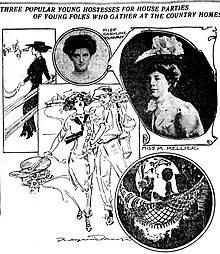This article needs to be updated. The reason given is: Needs historical context and examples. (June 2021) |
A house party is a type of party held at the home of the party's host.



Organization
editThis section has multiple issues. Please help improve it or discuss these issues on the talk page. (Learn how and when to remove these messages)
|
A house party might be organized several months or just a few hours in advance. News of a party may be spread by personal invitations, word of mouth, posted leaflets, or notices on social networking sites. Broad notice of a party – sometimes unintentionally – can result in large numbers of people attending who do not know the host personally and may be disruptive. A person who attends a house party but has not been invited is typically referred to as a "gatecrasher," particularly if the party is only open to invited guests; they are usually perceived negatively but may nonetheless be welcomed by the host. Mostly people bring a six-pack or a few good bottles, some extra bags and pills, or a couple of boxes of cigarettes to a house party.[1]
History
editAn early example of a house party can be seen in the play Mostellaria (The Haunted House) by the Roman playwright Plautus. In the play, a young man called Philolaches holds a house party with many friends while his father, Theopropides, is away on business.[2]
House parties have become a prominent feature in popular movies, particularly movies aimed at teenagers. While many have probably been present before the movie, The Party is one of the first to properly provide a scene of a house party.[3] However, the most popular film later on is House Party, featuring the hip-hop duo Kid 'n Play.[4]
In various cultures
editIn Croatia and Bosnia and Herzegovina, a sijelo (in Ijekavian), silo (in Ikavian) or selo (In Ekavian) is an evening social gathering at a house.
In Ireland, a Céilí is a social gathering which, in its traditional form, takes place in a domestic dwelling. Contemporary céliís often involve music and dancing and can also take place in a public or private meeting space, in addition to in a domestic setting.
In the United Kingdom, house parties may be referred to as a 'Skins' party, referring to a well-known TV show focusing on the lives of teenagers who often participate in and host open house parties.[5][6][7]
See also
editReferences
edit- ^ "How To Have Fun at a House Party". VICE. 3 November 2022. Retrieved 21 August 2024.
- ^ "Review: The Troubies turn an ancient Roman comedy into a modern 'Haunted House Party'". Los Angeles Times. 9 September 2016. Retrieved 26 November 2023.
- ^ "The ideal cause for cerebration: Kevin Jackson sees in the new year by". The Independent. 31 December 1992. Retrieved 26 November 2023.
- ^ Lang, Cady (13 January 2023). "Kid 'n Play on the 'House Party' reboot and friendship". TIME. Retrieved 21 August 2024.
- ^ Cooper, Leonie (25 January 2017). "'I was there' – remembering Foals' secret 'Skins' party". NME. Retrieved 26 November 2023.
- ^ "Teen spirit: The 'Skins' sensation sweeping France". The Independent. 30 July 2010. Retrieved 26 November 2023.
- ^ Ewens, Hannah (25 January 2017). "Remembering the British Teenage Phenomenon of 'Skins Parties'". Vice. Retrieved 26 November 2023.
Bibliography
editFor Sijelo:
- Milenko S. Filipović (1982). Among the people, native Yugoslav ethnography: selected writing of Milenko S. Filipović. Michigan Slavic Publications, Dept. of Slavic Languages and Literatures. p. 97. ISBN 9780930042479.
- Norman M. Naimark; Holly Case (2003). Yugoslavia and Its Historians: Understanding the Balkan Wars of the 1990s. Stanford University Press. ISBN 978-0-8047-4594-9.